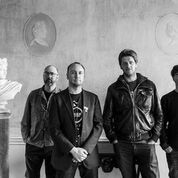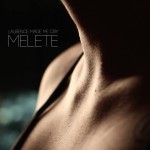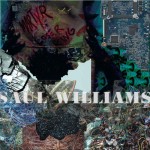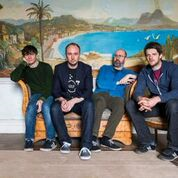
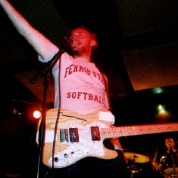
One of the most consistently glorious bands since the turn of the millennium, to my ears anyway, has been the sometimes ferocious, sometimes heartbreakingly tender Anglo-Irish group Jetplane Landing. Each and every one of them is infused (enthused?) with a passionate DIY ethic that only serves to magnify their brilliance.
Andrew Ferris (vocals, guitar) and Jamie Burchell (bass), took the time to reflect upon their stunning discography to date.
ZERO FOR CONDUCT (2001)
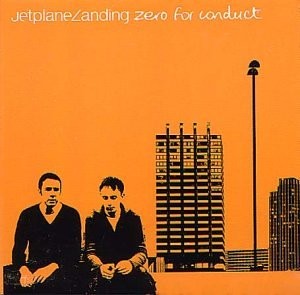
Jamie: Zero for Conduct was recorded over the space of a year, on weekends mainly, to an eight-track tape machine. All of the guitars on ‘Tiny Bombs’ are on one track bounced together. The only two real members of Jetplane Landing during the recording were Andrew and I. I had to pay Raife £50 one weekend to come down and play drums for us because he had a job selling clothes in Portobello market.
We recorded it in a one-car garage in Bognor Regis, West Sussex. To be honest, the only reason it sounds alright is because it was mixed by Dr. Sean Doherty at a studio owned by a diamond company. If Sean hadn’t helped out for free I’m not sure it would have seen the light of day.
I was always reading two books during this time: one for when I was tired and emotional and one for when I wasn’t. I’m not sure these books influenced the album other than I was spending a lot of time on my own, which may account for some of the albums more melancholic moments like ‘End of The Night‘ or ‘Miracle of Science‘. Listening wise, it was all Elliot Smith, Pavement and The Lapse. I remember listening to Belle and Sebastian’s ‘Boy with the Arab Strap’ album, alone in bed with headphones. It was encouragingly lo-fi.
Andrew: I remember Jamie coming over to the flat I was borrowing time in in London when we were writing the songs. I remember sitting on the sofa there and swapping between Nick Drake and Dinosaur Jr CDs. That’s where my head was at for those few months.
Jamie: All of the songs were a nightmare to record – we only had eight tracks! I guess you can tell the speaker blew out when we were recording the intro and outro to ‘End of the Night‘ and it never worked again!
ONCE LIKE A SPARK (2003)
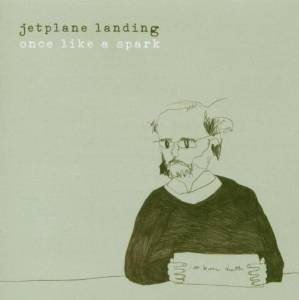
Andrew: This was recorded on ProTools. Sean Doherty was now at the recording controls too, not just the mixing. The session took place over a long hot summer, again back in the seaside town of Bognor Regis. By this time, we had graduated from the garage to the house. Cahir and Raife had joined the band full time. Cahir joining the band is the reason we made four albums, not two. It was the closest we have ever become to living like The Monkees. I look back on the time fondly.
Jamie: For us, at this time, it was all Helmet, Soundgarden, big riffs and wide legs, maybe even some AC/DC and of course, At the Drive-In. Thinking about it, one of my biggest memories from making the record was the first Mars Volta album coming out during our recording sessions. I went out and bought it and we gave it a spin. It wasn’t a great idea: their record sounded sonically amazing compared to ours. As an addendum I think Andrew and I both had a high regard for the pop songs of Daniel Bedingfield around this time – which was portentous because we ended up working the same booking agency as Beddy.
Andrew: Jamie introduced me to Thin Lizzy properly; I was aware of them growing up in Ireland – but didn’t appreciate them until Jamie broke down the songs and bass parts, which he knew by heart. Subconsciously, I wanted that dynamic but with post-hardcore riffs instead of blues rock ones. Another big influence on me was Jon Spencer Blues Explosion. ‘There is No Real Courage Unless There is Real Danger’ – is an attempt at bringing their grooves to our tunes.
Jamie: ‘Calculate the Risk’ was going to be a b-side. I had the chorus riff knocking about and the band just jammed out the rest at rehearsal one day. Musically it was the track I was most involved in on OLAS. Cahir wrote lots and lots of the music. Andrew wrote most of the words, I just kind of helped out. Strangely, Cahir, Andrew and I wrote nearly all of the vocal tunes for this album in one day. Raife and I had to go back to London for something, but on our return, Andrew, Cahir, and Dr. O’Doherty had gone buck wild: heavy bevvies and recalculating madness at the mixing desk. They’d cut out a sixty-second Santana style jam in the middle (no shit, there was a Hispanic jam in the middle of the song up to the last minute) and the rest is history. I remember Andrew coming towards me in the clear seaside morn, with up-all-night-eyes, looking slightly insane and very mildly delirious, saying, “This is going to be the single!” Good edit. Good self-A&Ring. Who needs Geffen Records! The next thing I know I’m staring Zane Lowe in the face on MTV2.
BACKLASH COP (2007)
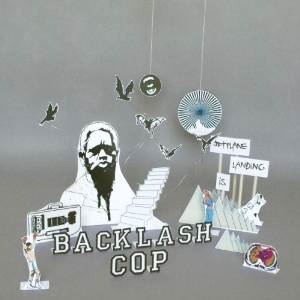
Jamie: It was an attempt to do something odd with all of the freedom we had, being truly independent – it would have felt profligate not to. I think some of Backlash worked, some of it didn’t work as well, but hey, I’m glad we made the record. When we toured in 2013 the Backlash songs were the best songs to play and the most fun for me on the nights. They were the party tunes.
Andrew: We recorded it in Southern Studios, North London, and is the only recording we have made with the time/money clock ticking hard. Harvey Birrel tracked the record. I think it went through his valve tape machine on the way to ProTools. Mucho editing took place, although nearly all of the backing tracks were played live – it was a first time for that.
Jamie: It was madness from beginning to end. Most of it was written in Andrew’s old flat in Blackheath… Blackheath, blackheart. Long winter nights taking the overland out to Andrew’s flat where we would talk about funk, black poetry, riffs (as usual) and what Cahir might be working on. When Cahir showed up he wrote the rest of the riffs needed to complete the album. I think we were all listening to disparate things around this time. I was listening to stuff like The Roots; Miles Davis and John Coltrane; Public Enemy; all kinds of stuff, but most definitely less rock music. ‘Standing in The Way of Control’ by Gossip was a great record around this time. Whenever I got the collywobbles about Backlash Cop being “out there” I thought about Gossip and said to myself, “turn up the mental!”
Andrew: On Backlash, I had started using Garageband rather than my four-track machine to demo songs. That made a cut-and-paste Hank Shocklee record possible for us for the first time.
Jamie: My favourite memory of this record is the first day we played any of the songs as a band in rehearsals. You should have seen the look on Cahir’s face. It was as if someone was waving a deep-fried shit under his nose; he was struggling. Me with a fucking cowbell at one side; funky Raife sitting counting in his breakbeats with his sticks above his head; Andrew gripping the mic and spitting out new words about genitals, and Cahir both confused and annoyed in the other corner, slowly, warily, putting the weight of his right foot onto a wah-wah pedal. Crazy times with a capital K.
DON’T TRY (2013)
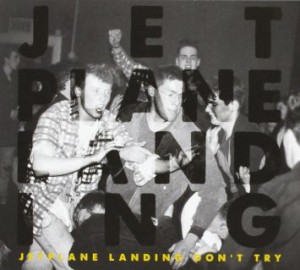 Jamie: This was recorded in Derry, in the Smalltown America Studios of the time. Chris Cassidy and Cahir put down the tracks straight to the computer. Raife had left the band by then (amicably, to work with other people) so our old mucker Craig Mckean, who played on the two tracks I couldn’t afford to pay my brother for on Zero for Conduct, came back and laid down the drums for us. I wasn’t present during the recording of the record apart from my bass parts. Looking back, I guess we’ve never made two albums the same. Is this a good or bad idea? I don’t know. We didn’t have the time or resources to do it any other way.
Jamie: This was recorded in Derry, in the Smalltown America Studios of the time. Chris Cassidy and Cahir put down the tracks straight to the computer. Raife had left the band by then (amicably, to work with other people) so our old mucker Craig Mckean, who played on the two tracks I couldn’t afford to pay my brother for on Zero for Conduct, came back and laid down the drums for us. I wasn’t present during the recording of the record apart from my bass parts. Looking back, I guess we’ve never made two albums the same. Is this a good or bad idea? I don’t know. We didn’t have the time or resources to do it any other way.
I was so hungover the day I recorded most of my bass parts I wanted to die. What made it worse is people kept coming into the studio to watch me recording, as if they wondered if I could still play (I wondered too as I hadn’t picked up a bass in anger in years). They came to see the ghost of me. STA records people kept looking in with tea and biscuits as if to see what the Hell it was, this auld English boy was doing here, still playing games. I’d arrived the night before a little tense. As a band, we hadn’t all seen each other in years so I guess we needed to blow off a little steam in the local bars. I nearly died that day… Exaggeration. I think I bought myself a breakfast sandwich and just hoped I wouldn’t faint.
Andrew: There was a five-year gap between the third and fourth albums and a lot of living and listening had been done between them. Musically, though, Hot Snakes, Les Savy Fav and Hey Mercedes were strong influences.
Jamie: I was living in a small village in the south of France – yikes, that sounds like it deserves a swift face punch, but it is true. I remember reading Jean Genet and Moby Dick – loved Moby Dick, got very nautical around this time. I liked Jack London’s books too – The People of the Abyss is good. I read some B Traven too, for the first time. Oh, and I read everything Hunter S Thompson put out in his lifetime. Books about boxing still hung around: my friend John-James gave me Raging Bull, the novel, and it’s good. You can see why they made a film out of it.
I was listening to jazz and soul at the time. I listened to tons of Tom Waits – think I dragged the arse out of it to be honest – I lived a quiet life of savage idleness. I worked on all my words for Don’t Try surrounded by vine and pretension.
As far as I know Cahir wrote nearly all the music on this album. I wrote most of the words (not including ‘Magnetic Sea‘) with Andrew editing the ones he liked/felt connected to the most. Cahir put a lot into this album. Kerrang gave it five stars; Cahir can have 3.7 for himself. Oh, and a shout-out to the machine that is Craig Mckean for his dedicated work during this record.
Andrew: As the band grew up, Cahir took more of a musical director role in the group. Jamie has always been the instigator of album themes and a creative control, and I became more like a record producer; editor and on the last record a ‘cheerleader’ of Cahir’s increasing powers. I wouldn’t call us a democracy but we certainly have become good at getting out of each other’s way.
THERE IS NO REAL COURAGE UNLESS THERE IS REAL DANGER (Compilation, 2003)
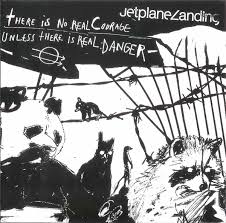 Andrew: Jetplane was on fire by the time it had toured Once Like a Spark a few times; we were playing faster and tighter than we ever had. Jamie is a big fan of live albums: Live at The Apollo, Live and Dangerous, Live at Leeds, Slade Alive! That aesthetic rubbed off on us and we recorded a few shows and lots of radio sessions on those tours. We also had quite a few smaller demos that didn’t progress but were decent songs – as it’s the same cost to press a 23 track single as it is to press a 2 track one we decided to clear the archive. I was really glad we did that, looking back, although I’m yet to meet anyone who has been able to sit through the whole thing. We gave the takings to the Red Cross, there was dark stuff going on in Afghanistan (I think) at the time. Some things never change.
Andrew: Jetplane was on fire by the time it had toured Once Like a Spark a few times; we were playing faster and tighter than we ever had. Jamie is a big fan of live albums: Live at The Apollo, Live and Dangerous, Live at Leeds, Slade Alive! That aesthetic rubbed off on us and we recorded a few shows and lots of radio sessions on those tours. We also had quite a few smaller demos that didn’t progress but were decent songs – as it’s the same cost to press a 23 track single as it is to press a 2 track one we decided to clear the archive. I was really glad we did that, looking back, although I’m yet to meet anyone who has been able to sit through the whole thing. We gave the takings to the Red Cross, there was dark stuff going on in Afghanistan (I think) at the time. Some things never change.
Looking at our records as a set, the one constant is that no matter what our influences have been we’ve always strapped them to wonky arrangements and unorthodox lyrics. We can’t do simple very well – other bands have taken parts of what we came up with; simplified it and been much more successful. Fair play to them, the boring bastards.
Jamie: But I guess in the end does it really matter? Our catalogue of songs is about our weird little fucking band that didn’t really make it in most people’s eyes but ripped it up a few good nights on the road and in the studio now and then too. Wildness, trying to do our own thing, fuck it! But I can’t see how we can make another record right now… Boo hoo, no more Jetplane… No more madness in the riff-filled night.
Which songs are we most proud of? All of them… Even the shit ones.
Andrew: They’re our babies; it’s cruel to have a favourite.

